How Lawyers Are About to Get Replaced Without Losing Their Jobs
Jul 20, 2024
|
Our Manifesto
Founding Team



I. A New Operating System for Labor
AI is not a new app. It’s not an assistant. It’s a new substrate for work.
We are now entering a post-Cognitive Cost economy—where amortizing expensive human understanding is no longer a necessity, because intelligence itself is effectively free.
Under this shift:
Hours are no longer the unit of value.
Judgment is no longer the bottleneck.
Expertise is no longer scarce—it’s scalable.
This isn’t about automating parts of labor.
It’s about replatforming all of it.
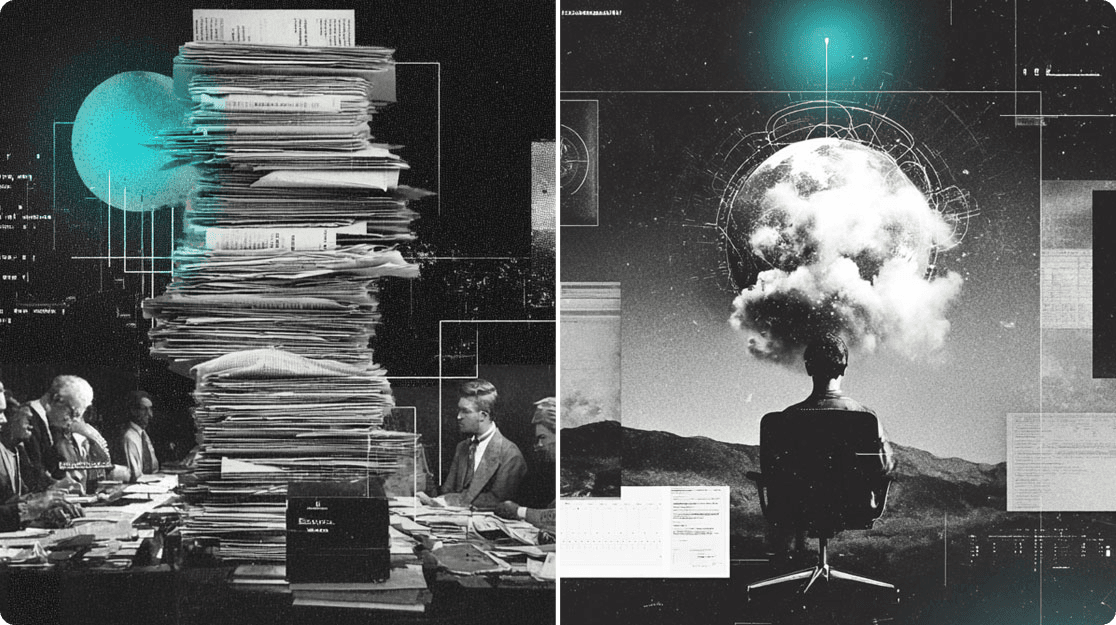
II. Law As the First Domino
The $6T professional services industry is built on the fiction that time equals value. The billable hour is a cleverly constructed inefficiency—designed to convert slow work into profit, and complexity into power.
But AI doesn’t just threaten the billable hour.
It makes the whole model obsolete.
When intelligent agents can read, reason, draft, and summarize with perfect memory and infinite patience, traditional legal workflows collapse.
Contracts that once took months to analyze are parsed in minutes.
Due diligence that absorbed teams for weeks is now completed—faster, cheaper, better—with 70% automation rates.
But here’s what’s often missed: Law isn’t just ripe for disruption.
Law is one of the hardest domains to get right.
It’s a high-stakes, heavily regulated domain where:
Accuracy must approach 100%
Every word can trigger liability or regulatory scrutiny
Decisions have uneven risk surfaces, varying by jurisdiction, industry, and context
AI in legal isn’t low-hanging fruit.
It’s a stress test for the entire concept of augmented labor.
And that’s why it’s the most powerful place to start.
Because in solving law, you don’t just automate a professional service—you pierce the core of how a company makes decisions.
Contracts and legal data are central to the enterprise.
Every NDA, MSA, LOI, and policy document encodes critical truths:
What a company owes
What rights it retains
What risks it’s carrying
What strategy it’s actually executing
What customers, suppliers, and regulators expect
Legal is not a silo. It's the metadata layer of the business.
Once legal is digitized, you unlock the intelligence that connects and informs every other function.
And critically:
The Chief Legal Officer isn’t just a gatekeeper for legal work.
They are a keystone executive—often directly responsible for, or structurally adjacent to, compliance, HR, audit, risk, privacy, governance, and procurement.
Once we earn the trust of the CLO, we’re positioned to expand not just within the legal function—but across the entire enterprise services stack. Function by function, system by system.
Legal is the first domino.
But it’s also the switchboard.
And the company that rearchitects legal from the inside out doesn’t stop with law.
It becomes the operating system for every high-trust human process in the enterprise.

III. From Automation to Augmentation
We’re not replacing lawyers.
We’re replacing inefficient legal systems.
Eudia isn’t “copilot plus contracts.”
We are building a new kind of legal team—one that merges AI-native systems with human discretion.In this model:
Agents draft, recommend, escalate intelligently.
Lawyers calibrate, orchestrate, and oversee.
Strategic advice becomes the majority of the role.
Clients don’t care about hours. They care about answers.
Augmented law delivers both precision and speed. And for the first time, cost and quality are not tradeoffs.

IV. Why Augmented Systems Win
Every task completed by an agent strengthens the next one. AI learns. Humans refocus. And decision cycles collapse from days to minutes.
Legacy systems don’t just lose on speed.
They lose on antifragility.
In traditional teams:
Knowledge stays siloed
Expertise disappears with churn
Outcomes plateau
In augmented teams:
Feedback loops compound
Tasks improve with volume
Scalability becomes default
Organizations that learn faster win.
And humans that orchestrate intelligence become irreplaceable.
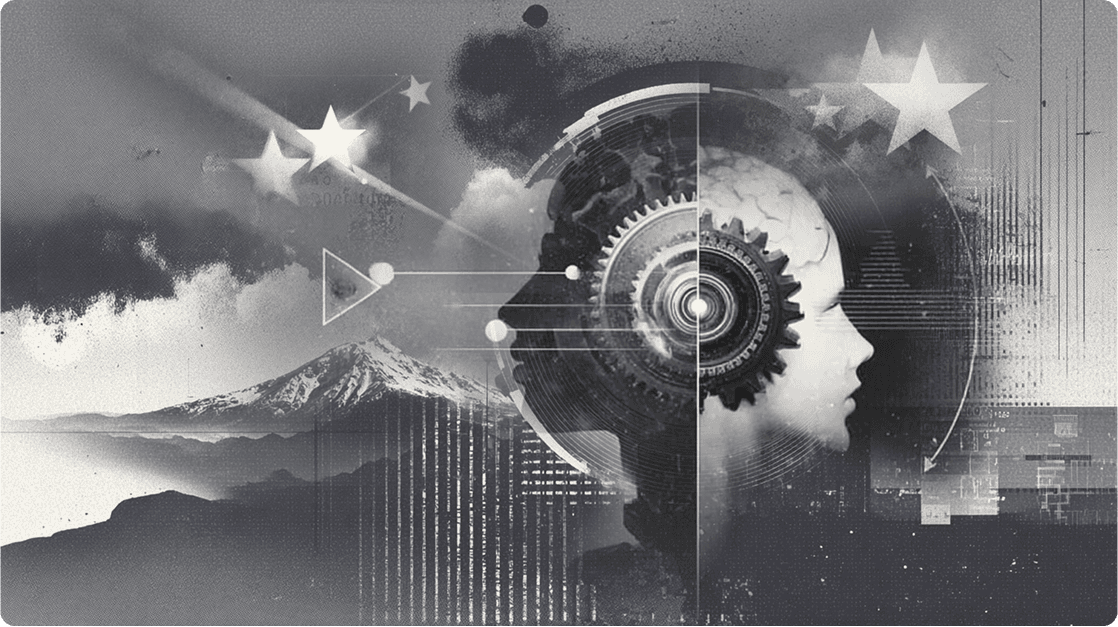
V. Time to Redeem Expertise
Augmentation isn’t anti-professional. It’s post-professional.
Lawyers no longer need to memorize citations.
They need to reason across hundreds of dynamic threads at once.
This isn’t dumbing down. It’s leveling up.
Because the work most people trained for is not the work they were built for.
The partner no longer reviews evidence.
They review risk.
The junior doesn’t redline.
They map out escalation paths.
Strategic value rises.
Routine work vanishes.
Expertise isn’t lost. It’s released from drudgery.
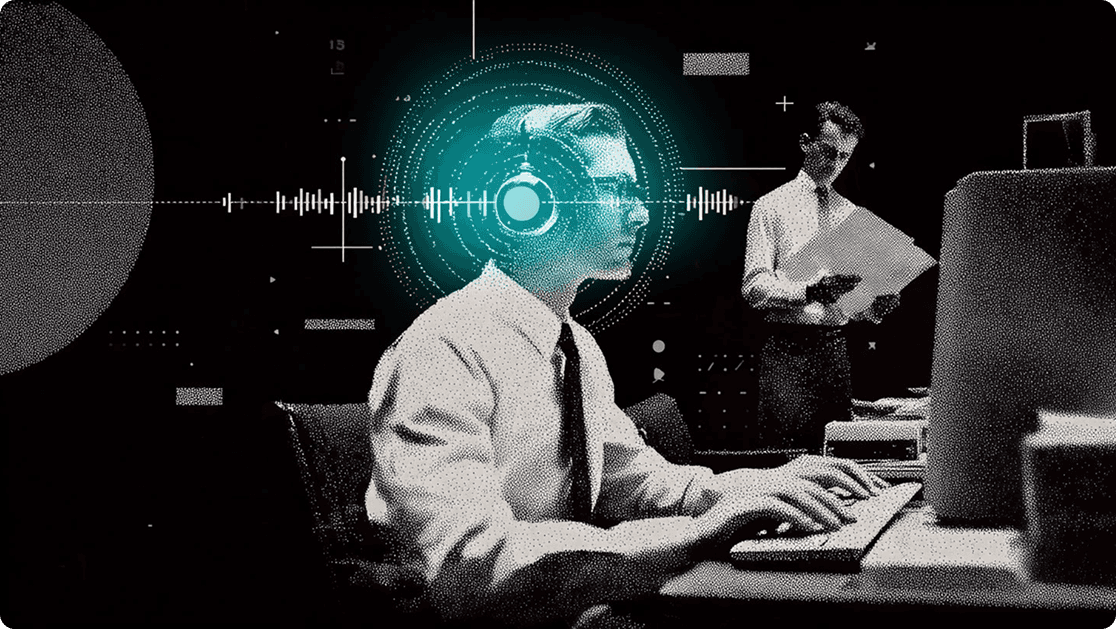
VI. The Moral Case
Most Americans live one legal event away from financial ruin. Most businesses pay a “regulatory tax” on innovation they’ll never recover.
This is why we founded Eudia.
I’ve seen both ends of the spectrum:
How working-class Americans can’t afford to assert their rights.
How innovative businesses are slowed by gatekeeping, not governance.
Legal was never supposed to be a luxury. It was supposed to be a safeguard.
The old system weaponizes complexity.
We’re building one that redeems access. At scale.
Because intelligence isn’t zero-sum.
And justice wasn’t meant to come with an invoice.
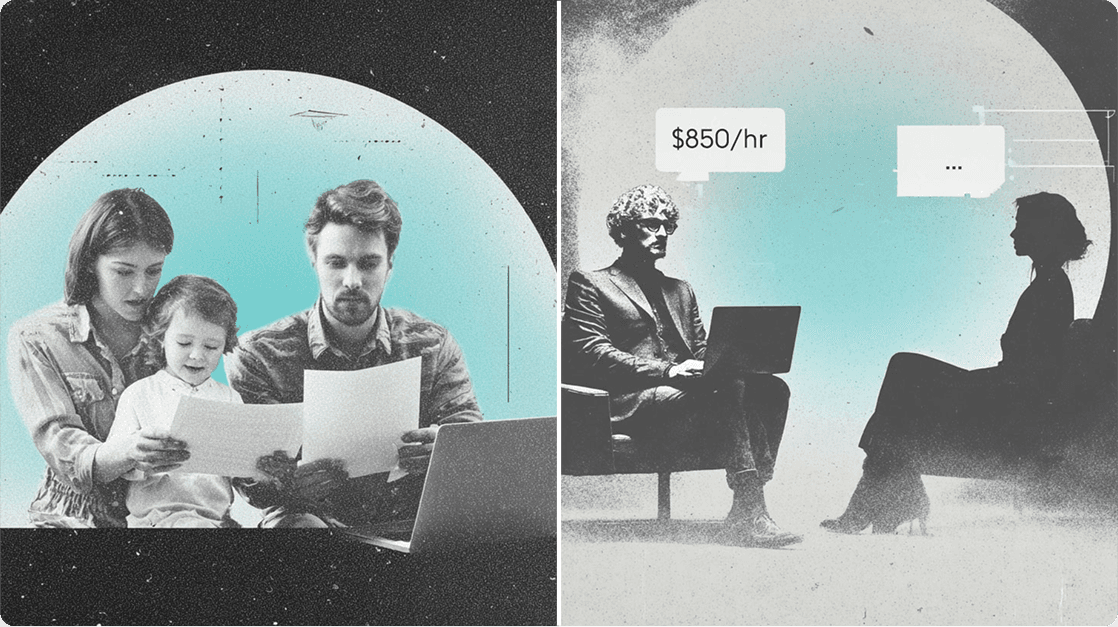
VII. The Opportunity
We are not a legaltech company.
Legaltech says: “Here’s a tool. You figure it out.”
We say: “Here’s an outcome. We’ll deliver it with you.”
Legaltech assumes law firms and in-house teams are just sides of a market.
They’re not.
Law firms make complexity billable.
In-house teams make complexity disappear.
Trying to serve both is a false construct—and a failed market.
We work exclusively with legal departments ready to shift from tasks to trust, from hourly budgets to strategic leverage.
And we’re not stopping with legal.
The Augmented Intelligence blueprint we’ve built—agentic orchestration around expert workflows—applies to every overloaded function in the enterprise:
Compliance
Procurement
Finance
Risk
Government
Our growth doesn’t come from more law.
It comes from unlocking scale in judgment-intensive work.
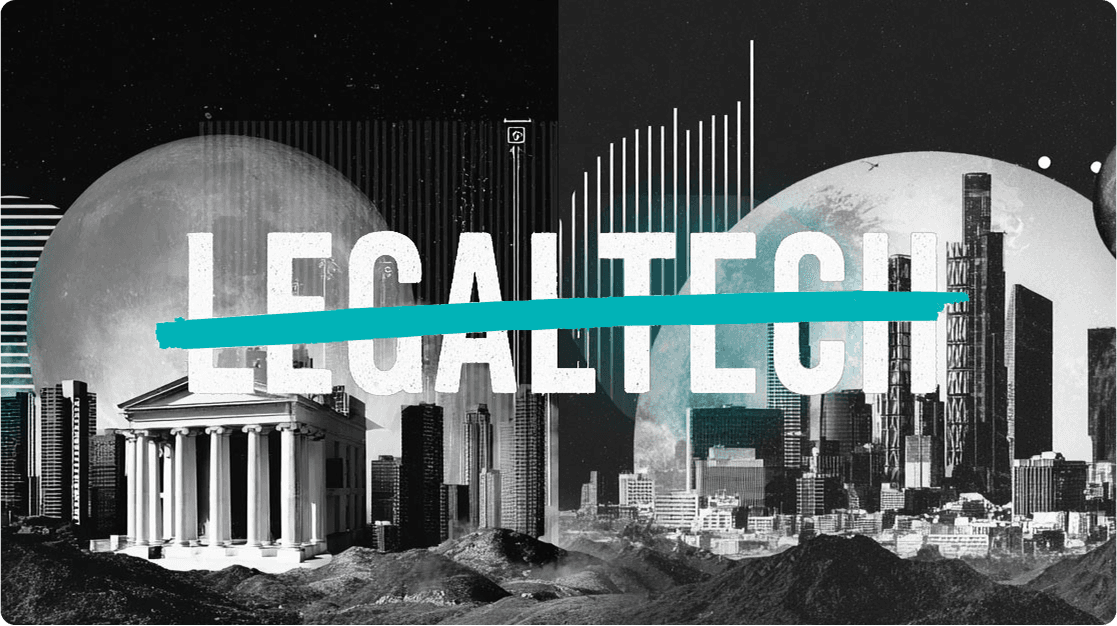
VIII. Conclusion: Eudaimonia
We named our company after a concept from Aristotle:
Eudaimonia — the fulfillment of potential through meaningful work.
That’s what AI enables.
It’s not about doing all the work.
It’s about doing 100x more of the work that matters.
Tasks belong to agents. Understanding belongs to humans.
Eudia sits at that border.
This is the end of labor as we know it.
Not because humans are obsolete—
but because the systems we’ve forced them into finally are.
The new question isn’t:
“How do we automate humans?”
It’s:
“What can humans now become?”

I. A New Operating System for Labor
AI is not a new app. It’s not an assistant. It’s a new substrate for work.
We are now entering a post-Cognitive Cost economy—where amortizing expensive human understanding is no longer a necessity, because intelligence itself is effectively free.
Under this shift:
Hours are no longer the unit of value.
Judgment is no longer the bottleneck.
Expertise is no longer scarce—it’s scalable.
This isn’t about automating parts of labor.
It’s about replatforming all of it.

II. Law As the First Domino
The $6T professional services industry is built on the fiction that time equals value. The billable hour is a cleverly constructed inefficiency—designed to convert slow work into profit, and complexity into power.
But AI doesn’t just threaten the billable hour.
It makes the whole model obsolete.
When intelligent agents can read, reason, draft, and summarize with perfect memory and infinite patience, traditional legal workflows collapse.
Contracts that once took months to analyze are parsed in minutes.
Due diligence that absorbed teams for weeks is now completed—faster, cheaper, better—with 70% automation rates.
But here’s what’s often missed: Law isn’t just ripe for disruption.
Law is one of the hardest domains to get right.
It’s a high-stakes, heavily regulated domain where:
Accuracy must approach 100%
Every word can trigger liability or regulatory scrutiny
Decisions have uneven risk surfaces, varying by jurisdiction, industry, and context
AI in legal isn’t low-hanging fruit.
It’s a stress test for the entire concept of augmented labor.
And that’s why it’s the most powerful place to start.
Because in solving law, you don’t just automate a professional service—you pierce the core of how a company makes decisions.
Contracts and legal data are central to the enterprise.
Every NDA, MSA, LOI, and policy document encodes critical truths:
What a company owes
What rights it retains
What risks it’s carrying
What strategy it’s actually executing
What customers, suppliers, and regulators expect
Legal is not a silo. It's the metadata layer of the business.
Once legal is digitized, you unlock the intelligence that connects and informs every other function.
And critically:
The Chief Legal Officer isn’t just a gatekeeper for legal work.
They are a keystone executive—often directly responsible for, or structurally adjacent to, compliance, HR, audit, risk, privacy, governance, and procurement.
Once we earn the trust of the CLO, we’re positioned to expand not just within the legal function—but across the entire enterprise services stack. Function by function, system by system.
Legal is the first domino.
But it’s also the switchboard.
And the company that rearchitects legal from the inside out doesn’t stop with law.
It becomes the operating system for every high-trust human process in the enterprise.

III. From Automation to Augmentation
We’re not replacing lawyers.
We’re replacing inefficient legal systems.
Eudia isn’t “copilot plus contracts.”
We are building a new kind of legal team—one that merges AI-native systems with human discretion.In this model:
Agents draft, recommend, escalate intelligently.
Lawyers calibrate, orchestrate, and oversee.
Strategic advice becomes the majority of the role.
Clients don’t care about hours. They care about answers.
Augmented law delivers both precision and speed. And for the first time, cost and quality are not tradeoffs.

IV. Why Augmented Systems Win
Every task completed by an agent strengthens the next one. AI learns. Humans refocus. And decision cycles collapse from days to minutes.
Legacy systems don’t just lose on speed.
They lose on antifragility.
In traditional teams:
Knowledge stays siloed
Expertise disappears with churn
Outcomes plateau
In augmented teams:
Feedback loops compound
Tasks improve with volume
Scalability becomes default
Organizations that learn faster win.
And humans that orchestrate intelligence become irreplaceable.

V. Time to Redeem Expertise
Augmentation isn’t anti-professional. It’s post-professional.
Lawyers no longer need to memorize citations.
They need to reason across hundreds of dynamic threads at once.
This isn’t dumbing down. It’s leveling up.
Because the work most people trained for is not the work they were built for.
The partner no longer reviews evidence.
They review risk.
The junior doesn’t redline.
They map out escalation paths.
Strategic value rises.
Routine work vanishes.
Expertise isn’t lost. It’s released from drudgery.

VI. The Moral Case
Most Americans live one legal event away from financial ruin. Most businesses pay a “regulatory tax” on innovation they’ll never recover.
This is why we founded Eudia.
I’ve seen both ends of the spectrum:
How working-class Americans can’t afford to assert their rights.
How innovative businesses are slowed by gatekeeping, not governance.
Legal was never supposed to be a luxury. It was supposed to be a safeguard.
The old system weaponizes complexity.
We’re building one that redeems access. At scale.
Because intelligence isn’t zero-sum.
And justice wasn’t meant to come with an invoice.

VII. The Opportunity
We are not a legaltech company.
Legaltech says: “Here’s a tool. You figure it out.”
We say: “Here’s an outcome. We’ll deliver it with you.”
Legaltech assumes law firms and in-house teams are just sides of a market.
They’re not.
Law firms make complexity billable.
In-house teams make complexity disappear.
Trying to serve both is a false construct—and a failed market.
We work exclusively with legal departments ready to shift from tasks to trust, from hourly budgets to strategic leverage.
And we’re not stopping with legal.
The Augmented Intelligence blueprint we’ve built—agentic orchestration around expert workflows—applies to every overloaded function in the enterprise:
Compliance
Procurement
Finance
Risk
Government
Our growth doesn’t come from more law.
It comes from unlocking scale in judgment-intensive work.

VIII. Conclusion: Eudaimonia
We named our company after a concept from Aristotle:
Eudaimonia — the fulfillment of potential through meaningful work.
That’s what AI enables.
It’s not about doing all the work.
It’s about doing 100x more of the work that matters.
Tasks belong to agents. Understanding belongs to humans.
Eudia sits at that border.
This is the end of labor as we know it.
Not because humans are obsolete—
but because the systems we’ve forced them into finally are.
The new question isn’t:
“How do we automate humans?”
It’s:
“What can humans now become?”

I. A New Operating System for Labor
AI is not a new app. It’s not an assistant. It’s a new substrate for work.
We are now entering a post-Cognitive Cost economy—where amortizing expensive human understanding is no longer a necessity, because intelligence itself is effectively free.
Under this shift:
Hours are no longer the unit of value.
Judgment is no longer the bottleneck.
Expertise is no longer scarce—it’s scalable.
This isn’t about automating parts of labor.
It’s about replatforming all of it.

II. Law As the First Domino
The $6T professional services industry is built on the fiction that time equals value. The billable hour is a cleverly constructed inefficiency—designed to convert slow work into profit, and complexity into power.
But AI doesn’t just threaten the billable hour.
It makes the whole model obsolete.
When intelligent agents can read, reason, draft, and summarize with perfect memory and infinite patience, traditional legal workflows collapse.
Contracts that once took months to analyze are parsed in minutes.
Due diligence that absorbed teams for weeks is now completed—faster, cheaper, better—with 70% automation rates.
But here’s what’s often missed: Law isn’t just ripe for disruption.
Law is one of the hardest domains to get right.
It’s a high-stakes, heavily regulated domain where:
Accuracy must approach 100%
Every word can trigger liability or regulatory scrutiny
Decisions have uneven risk surfaces, varying by jurisdiction, industry, and context
AI in legal isn’t low-hanging fruit.
It’s a stress test for the entire concept of augmented labor.
And that’s why it’s the most powerful place to start.
Because in solving law, you don’t just automate a professional service—you pierce the core of how a company makes decisions.
Contracts and legal data are central to the enterprise.
Every NDA, MSA, LOI, and policy document encodes critical truths:
What a company owes
What rights it retains
What risks it’s carrying
What strategy it’s actually executing
What customers, suppliers, and regulators expect
Legal is not a silo. It's the metadata layer of the business.
Once legal is digitized, you unlock the intelligence that connects and informs every other function.
And critically:
The Chief Legal Officer isn’t just a gatekeeper for legal work.
They are a keystone executive—often directly responsible for, or structurally adjacent to, compliance, HR, audit, risk, privacy, governance, and procurement.
Once we earn the trust of the CLO, we’re positioned to expand not just within the legal function—but across the entire enterprise services stack. Function by function, system by system.
Legal is the first domino.
But it’s also the switchboard.
And the company that rearchitects legal from the inside out doesn’t stop with law.
It becomes the operating system for every high-trust human process in the enterprise.

III. From Automation to Augmentation
We’re not replacing lawyers.
We’re replacing inefficient legal systems.
Eudia isn’t “copilot plus contracts.”
We are building a new kind of legal team—one that merges AI-native systems with human discretion.In this model:
Agents draft, recommend, escalate intelligently.
Lawyers calibrate, orchestrate, and oversee.
Strategic advice becomes the majority of the role.
Clients don’t care about hours. They care about answers.
Augmented law delivers both precision and speed. And for the first time, cost and quality are not tradeoffs.

IV. Why Augmented Systems Win
Every task completed by an agent strengthens the next one. AI learns. Humans refocus. And decision cycles collapse from days to minutes.
Legacy systems don’t just lose on speed.
They lose on antifragility.
In traditional teams:
Knowledge stays siloed
Expertise disappears with churn
Outcomes plateau
In augmented teams:
Feedback loops compound
Tasks improve with volume
Scalability becomes default
Organizations that learn faster win.
And humans that orchestrate intelligence become irreplaceable.

V. Time to Redeem Expertise
Augmentation isn’t anti-professional. It’s post-professional.
Lawyers no longer need to memorize citations.
They need to reason across hundreds of dynamic threads at once.
This isn’t dumbing down. It’s leveling up.
Because the work most people trained for is not the work they were built for.
The partner no longer reviews evidence.
They review risk.
The junior doesn’t redline.
They map out escalation paths.
Strategic value rises.
Routine work vanishes.
Expertise isn’t lost. It’s released from drudgery.

VI. The Moral Case
Most Americans live one legal event away from financial ruin. Most businesses pay a “regulatory tax” on innovation they’ll never recover.
This is why we founded Eudia.
I’ve seen both ends of the spectrum:
How working-class Americans can’t afford to assert their rights.
How innovative businesses are slowed by gatekeeping, not governance.
Legal was never supposed to be a luxury. It was supposed to be a safeguard.
The old system weaponizes complexity.
We’re building one that redeems access. At scale.
Because intelligence isn’t zero-sum.
And justice wasn’t meant to come with an invoice.

VII. The Opportunity
We are not a legaltech company.
Legaltech says: “Here’s a tool. You figure it out.”
We say: “Here’s an outcome. We’ll deliver it with you.”
Legaltech assumes law firms and in-house teams are just sides of a market.
They’re not.
Law firms make complexity billable.
In-house teams make complexity disappear.
Trying to serve both is a false construct—and a failed market.
We work exclusively with legal departments ready to shift from tasks to trust, from hourly budgets to strategic leverage.
And we’re not stopping with legal.
The Augmented Intelligence blueprint we’ve built—agentic orchestration around expert workflows—applies to every overloaded function in the enterprise:
Compliance
Procurement
Finance
Risk
Government
Our growth doesn’t come from more law.
It comes from unlocking scale in judgment-intensive work.

VIII. Conclusion: Eudaimonia
We named our company after a concept from Aristotle:
Eudaimonia — the fulfillment of potential through meaningful work.
That’s what AI enables.
It’s not about doing all the work.
It’s about doing 100x more of the work that matters.
Tasks belong to agents. Understanding belongs to humans.
Eudia sits at that border.
This is the end of labor as we know it.
Not because humans are obsolete—
but because the systems we’ve forced them into finally are.
The new question isn’t:
“How do we automate humans?”
It’s:
“What can humans now become?”



